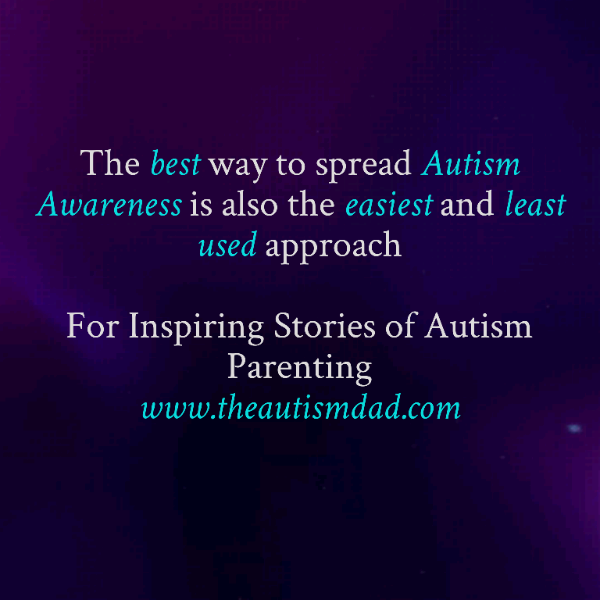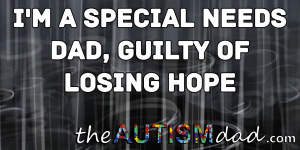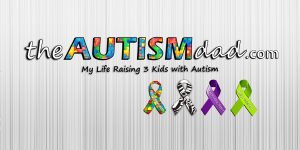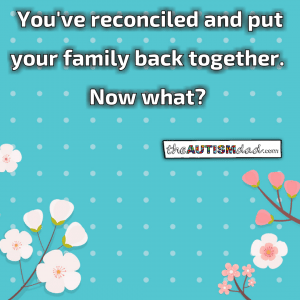Disclaimer: I’m not sure how much sense this will make. My head has been pounding for the last few hours and I really struggled to make my point. Hopefully, you’ll see where I’m coming from but if not, simply ask in the comments and I’ll be happy to clarify.
Autism is still very much a mystery to the world and so likewise, Autism Parenting is as well. This is a problem that the Autism Awareness movement has been working on for a very long time with limited success.
The problem with Autism Awareness, Acceptance, Understanding or whatever you want to call it, is that it’s not personal enough.
There tends to be two approaches of raising awareness and both are flawed, in my opinion.
The first and most common approach is what I refer to as clinical. This is when people are using information that can easily be found in books or taught in school, to educate the public about Autism.
I very much dislike this approach because it’s completely depersonalized. The clinical approach simply regurgitates facts or statistics and tries to forcefeed this to the general population. While this information is important, it does very little to raise awareness.
The second approach is the one that a large Autism Organization takes and I personally feel this is irresponsible at best. The approach I’m talking about is the use of fear or scare tactics, to make people aware of Autism..
I’m not even going explain why I don’t agree with or support that and I shouldn’t need to explain why that approach isn’t effective.
Here’s the bottom line…
Over the last 11 years, I’ve found the best way to spread Autism Awareness to people across the globe. You don’t need to be a doctor or specialist. You don’t need an advanced degree, an enormous platform or be a celebrity either.
All you need to do is share your story with anyone who’s willing to listen.
I have never found success with force-feeding information to anyone. In fact, it’s actually counterproductive in many ways.
Sharing your family’s story about how Autism touches your life, not only demonstrates how profoundly dynamic Autism is but it also personalizes it in a way that even people outside the community can relate to.
The idea behind this is simple and extremely effective.
By sharing your family’s journey, especially during Autism Awareness month, you will be helping to show the world how different Autism is for each person and family touched by it. The world will see that while Autism isn’t a walk in the park, it’s not something that should be feared either.
When the Autism community shares their stories, the world around us see how some people and families can struggle more than others because Autism impacts everyone differently.
It’s not always pretty but it’s not always ugly. Autism can’t be truly understand because someone’s read a book. Real life is very different than what is presented in a book or on TV.
By allowing people to see, read or hear about your personal experience with Autism, they’re getting a more intimate view and see how Autism impacts real people, in very real ways.
Please consider sharing your story with the world. Social media is a great tool for things like this. I’ll help you share your story if you like. We just need to get the stories out there and people will listen. Not all my readers are Autism parents. There’s a large number of people who have no experience with Autism first hand but follow our journey and hopefully have a better understanding of what Autism is….





I agree, Rob. You need to be aware of the facts (and statistics), but if you want people to understand the issues, you have to show them. And you do that by telling your story. Numbers tell you how big a problem is, but showing them what it’s like, grabs people by the throat. But more importantly, aside from the ‘limitations’, we should also show the ‘possibilities’. It hurt me (because it hurt the child) when a professional care giver said she was handicapped because of her autism. She didn’t agree.
The sad part is: I understand both sides. Yes. Autism offers limitations to both the person who has it and his or her surrounding. There are, after all, things you can’t do. But, and that part I miss the most, we talk about those limitations far more than how the individual copes with them – and sometimes finds ways to turn them into ‘possiiblities’. That’s the news I try to share. Each limitation may open a possibility in the way they handle things or find systems to cope with them.